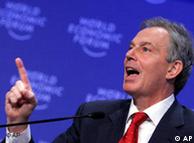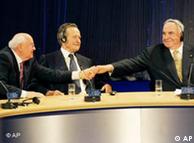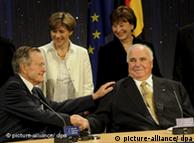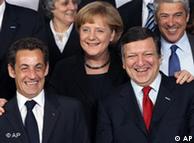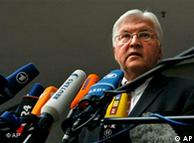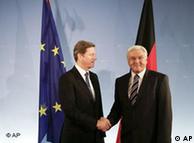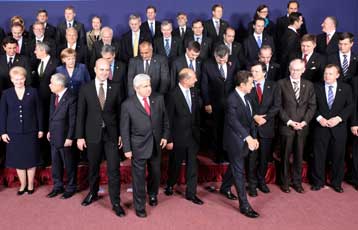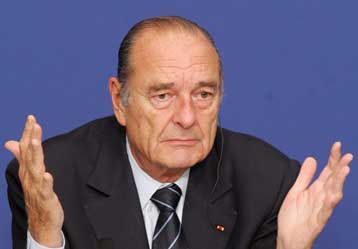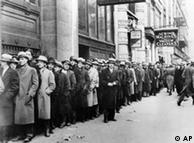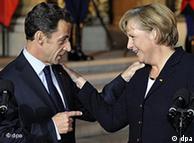POLITICS | 31.10.2009
Merkel and Sarkozy scupper Blair's presidential hopes
Asked if he supported Blair, President Sarkozy told reporters, "You know very well that the names in the first wave are not necessarily the winners in the final round," and went on to indicate that Angela Merkel was also against Blair's candidacy for what could become the most important appointment in the European Union.
Instead, Sarkozy said that he and Merkel had agreed to join forces and back the same candidate for the job, and that they shared a vision for both the top posts to be created under the Lisbon Treaty. Though they apparently have favored runners, Sarkozy declined to reveal them.
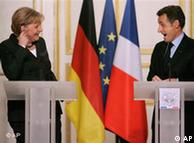 Sarkozy and Merkel have agreed to back the same candidate
Sarkozy and Merkel have agreed to back the same candidate
"With Angela Merkel, we have agreed that France and Germany will have a common vision and support the same candidate when the time comes," Sarkozy said.
The failure to back Blair will be seen as a snub to Britain after Prime Minister Gordon Brown campaigned personally for his former government partner this week.
Sarkozy turns against his old ally
Sarkozy once declared his support for Blair's candidacy, but the British campaign to push Blair stumbled when Brown failed to win the blessing of European socialists before the summit began on Thursday.
Some prominent leaders of the left-wing parliamentary group, allied to Blair's governing Labour party, refused their backing because of Blair's close relationship to former US President George W. Bush and the leading role he played in the war in Iraq.
"If he cannot get the backing of the socialist group, being a Labour man himself, it's a very difficult situation," Danish Prime Minister Lars Lokke Rasmussen said.
Appointing Blair would also have been difficult for Germany and France because Britain is not among the 16 countries that use the euro currency and the island nation is seen as euroskeptic.
No favorites
The decision leaves the race for the EU candidacy open, though leaders are likely to choose a center-right candidate, as Europe is currently dominated by conservative leaders. Dutch Prime Minister Jan Peter Balkenende said on Friday he would not rule himself out if pushed into a bid by others. "If others are asking, then you are a candidate," he said.
Other possibilities could include Luxembourg Prime Minister Jean-Claude Juncker, Finnish premier Paavo Lipponen and former Belgian premier Guy Verhofstadt.
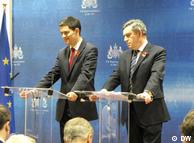 British foreign minister David Milliband, left, could become Europe's foreign policy chief
British foreign minister David Milliband, left, could become Europe's foreign policy chief
Sarkozy said that a summit of EU leaders is scheduled for mid-November to discuss possible candidates. But the job description remains vague, as the Lisbon Treaty is yet to come into force and it contains few details about what it entails and what powers should be attached to it.
British foreign minister for Europe
As well as a president, the EU is searching for a foreign policy chief to raise the bloc's influence on the world stage. Here EU members want to strike a careful balance between someone with enough political weight to have credibility in meetings with the United States or China, and yet enough sensitivity not to sideline Europe's political leaders.
Ironically, the name most frequently being attached to this post is that of another British Labour Party politician - current Foreign Minister David Milliband. Milliband this week declared himself "unavailable" for the post, but recent remarks suggesting Europe should play a bigger global role have been interpreted as a sign that the position holds genuine appeal.
bk/Reuters/AFP
Editor: Andreas Illmer
